|
|
|
Sort Order |
|
|
|
Items / Page
|
|
|
|
|
|
|
| Srl | Item |
| 1 |
ID:
110797
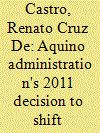

|
|
|
|
|
| Publication |
2012.
|
| Summary/Abstract |
This article examines how the South China Sea dispute impacts on the Aquino
administration's 2011 decision to shift the focus of the Armed Forces of the
Philippines (AFP) from internal security to territorial defense. Upon assuming
office in 2010, President Benigno Aquino announced his intention to modernize
the AFP, to buttress the country's territorial defense, and to check China's
aggressive assertion of its sovereignty over the South China Sea. However, the
lack of financial support from the Philippine Congress prevented the immediate
implementation of the plan. The March 2, 2011 incident between a Philippine
survey ship and two Chinese patrol boats at Reed Bank, however, prompted the
Aquino administration to redirect the country's security focus. The incident also
triggered a strong clamor from the military and other government institutions for
the allocation of resources to the development of the AFP's territorial defense
capabilities. China's heavy-handed behavior in the South China Sea, as well as its
uncompromising diplomatic posturing, further convinced the Aquino administration
of the inevitability of facing China militarily in the near future. Coincidentally,
the United States supports the Philippines' shift to territorial/maritime defense
and pledges to provide its ally with affordable military hardware. In conclusion, the
article observes that the convergence of strategic and diplomatic events-an offshoot
of the March 2 Reed Bank incident-finally made the Aquino administration and
the AFP take the first step in the long and arduous process of building a modest
military capability for territorial defense.
|
|
|
|
|
|
|
|
|
|
|
|
|
|
|
|
| 2 |
ID:
110796
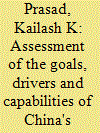

|
|
|
|
|
| Publication |
2012.
|
| Summary/Abstract |
Considering the growth, broadening national interests and the spectacular rise in
energy requirements that resulted in the import of 4.3 million bbl/d of crude oil in
2010-for China, ensuring mechanisms that guarantee energy supply to a booming
domestic economy is becoming increasingly vital. Beijing recognizes a strong
navy would constitute one such mechanism, and has for some time been in the
process of upgrading its naval force. A strong navy would serve other interests as
well. For one, it could help Beijing increase the chances of a favorable outcome
in case of a conflict with Taiwan. It could also allow China to settle the numerous
territorial claims in its littoral close to its ideal, with little involvement from nonclaimant states. Additionally, it could allow Beijing to project power further in
the Asia-Pacific. This article is an assessment of the various factors driving naval
modernization in the People's Republic of China (PRC). It also details China's
current naval capabilities and the recent trends in military expenditure. It will
conclude by suggesting that though China's navy is being rapidly built up, it
would be imprudent to assume that such modernization necessarily indicates future
Chinese bellicosity; and even if hegemony were a goal for the PRC, concluding that
naval aggression will be the most efficient way for Beijing to realize such ambitions
would be erroneous.
|
|
|
|
|
|
|
|
|
|
|
|
|
|
|
|
| 3 |
ID:
110800


|
|
|
|
|
| Publication |
2012.
|
| Summary/Abstract |
A unique phenomenon, the "conflict-reconciliation" cycle prevalent on the Korean
peninsula consists of three levels of fluctuating mechanisms: the vibrating ChinaU.S. rivalry at the international level; the chaotic Northeast Asia (NEA) management
mechanism at the regional level; and the vicious cycle of mutual cognition at the
bilateral level. This cycle has been shaped by the diversified strategic objectives of
NEA countries, the instability of the Republic of Korea (ROK) political structure,
the fluid nature of the power structure of the Democratic People's Republic of Korea
(DPRK) and the impulse of related countries to influence the regional situation.
The key to reverse and to reorient this cycle toward a more amicable direction lies in
the proper handling of big power relations, the improving of regional political cycles,
the upgrading of the diplomatic strategies of related countries, and understanding the
DPRK more precisely. As one of the most important issues confronting ROK
diplomacy, the "conflict-reconciliation" cycle offers a reference for solving other
regional and international problems, such as the rivalry between China and the United
States against the backdrop of China's rise, the proper role of ROK diplomacy,
the mutual understanding between the two Koreas, and the DPRK's efforts to
ease its political dilemma through economic means.
|
|
|
|
|
|
|
|
|
|
|
|
|
|
|
|
| 4 |
ID:
110793
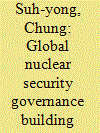

|
|
|
|
|
| Publication |
2012.
|
| Summary/Abstract |
This paper addresses the issues on nuclear security governance building through
the Nuclear Security Summit. Given the increased threat of nuclear terrorism by
non-state actors, the current global mechanism addressing nuclear security has
revealed serious limitations. Despite various legally binding instruments-such as the
Convention on the Physical Protection of Nuclear Material (CPPNM), the International
Convention for the Suppression of Acts of Nuclear Terrorism (ICSANT), the UN
Security Council Resolution 1540 and other non-legally-binding instruments-global
efforts to address nuclear terrorism have faced serious challenges to their effectiveness.
As a result, after U.S. President Obama's speech in 2009 in Prague, the first Nuclear
Security Summit Meeting was successfully held in Washington, D.C. Based on its
success, the second Nuclear Security Summit Meeting is scheduled to be held in
March 2012 in Seoul, Korea. In addition to the ongoing issues, the Seoul Meeting
will deal with new issues such as nuclear safety in reflection of the 2011 Fukushima
accident. The meeting may also consider discussions on other important issues
such as the framework agreement, involvement of relevant stakeholders, further
institutionalization of the Nuclear Security Summit Meeting and sustainable financing
as long-term agendas. Ultimately, this process will reinforce the effectiveness of the
global efforts to tackle nuclear terrorism and other related issues.
|
|
|
|
|
|
|
|
|
|
|
|
|
|
|
|
| 5 |
ID:
110798
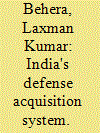

|
|
|
|
|
| Publication |
2012.
|
| Summary/Abstract |
India's defense acquisition system has evolved over the years and now consists of
hierarchical and institutional structures and detailed procedures. The evolved system
has created an atmosphere for undertaking acquisition in a more methodical,
process-oriented and objective manner. The success of the evolved system is evident
from its ability to execute orders worth billions of dollars every year. However,
despite all the success of the evolved system there are certain weak areas that demand
reforms to make the system more accountable and deliver within a prescribed time
frame by optimally utilizing the available resources. Among others, the arms
acquisition needs to flow from a strong planning process that is presently constrained
to bring in the required inter- and intra-service prioritization of weapons acquisition
and ensure holistic development of national capability. The formulation of weapons
systems' requirements-a critical stage of the acquisition cycle, which is presently
carried out within the individual armed forces with inherent weaknesses-needs to
be undertaken preferably by a dedicated and professional body. The accountability
of acquisition also needs to be strengthened by bringing about a centralized, integrated
and professional agency with the responsibility of ensuring timely acquisition.
|
|
|
|
|
|
|
|
|
|
|
|
|
|
|
|
| 6 |
ID:
110799


|
|
|
|
|
| Publication |
2012.
|
| Summary/Abstract |
After the occurrence of the 9/11 terrorist attacks against the United States, the
threat of terrorism as a newly emerged non-traditional threat to international peace and
security, and domestic social order, could no longer be under-estimated throughout
the world, and in the Asia-Pacific region in particular. However, in the global
campaign to counter terrorism in general terms and specifically in preventing and
suppressing maritime terrorism, many legal challenges will arise, beyond expectations.
The UN-oriented conventions, regional arrangements and bilateral treaties could be
referred to as the legal basis in doctrine. However, lack of political will and consensus
of the parties concerned and absence of a uniformed definition of terrorism would
still construe further obstacles to undermine efforts through international cooperation
in this regard.
|
|
|
|
|
|
|
|
|
|
|
|
|
|
|
|
| 7 |
ID:
110795
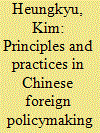

|
|
|
|
|
| Publication |
2012.
|
| Summary/Abstract |
This article explains principles and practices in China's foreign policy decisionmaking-and their implications for its policy toward South Korea. The author
argues that more serious attention should be paid to "democratic centralism" as a
guiding principle of decision-making, even in foreign affairs. This principle
favors consensus-building, coordination, and compromise in policymaking. As a
result, China often suffers time-wastage and inertia on non-routine issues in its
policymaking, which is quite different from the image of the top-down model.
Reflecting the structure of Chinese policymaking, China's foreign policies are more
likely to be risk averse, conservative, and prone to following status-quo policies.
China prefers the status quo to renovation of its Korea policy. Instead of taking
any new initiatives, China's foreign policy toward the Korean peninsula is likely to
adhere to its current policy priority of maintaining stability on the Peninsula. It is
also noteworthy that China may gradually depart from its slow and reactive foreign
policies to more proactive ones. As China becomes more capable of processing
non-routine issues, while making them routine ones, more proactive policies will
be realized although the gradual nature of Chinese decision-making is expected to
remain intact for the time-being.
|
|
|
|
|
|
|
|
|
|
|
|
|
|
|
|
| 8 |
ID:
110794


|
|
|
|
|
| Publication |
2012.
|
| Summary/Abstract |
This paper discusses the national security challenges and policy dilemmas that
South Korea is predicted to face in the year 2012. North Korea is currently
engrossed in efforts for stabilization of its new regime led by Kim Jong Un. It is
expected that for the time being the two Koreas will seek signals to help facilitate
a shift in the bilateral situation amid the continuing tense situation. Meanwhile,
there remains a high possibility of recurrence of a crisis situation on the Korean
peninsula due to accumulated internal conflicts and the unproven leadership of
the North's new leader. Concerning the North's nuclear program, it is difficult to
expect it will be settled in the way intended at the time of launching the Six-Party
Talks. Under such circumstances, the international community's interest is
focused on what impact the new defense strategy adopted by the United States,
including the planned cuts in the U.S. defense budget over the next decade, will
have on the security situation in Northeast Asia. China's military buildup based
on its rapid economic development has become one of the main security concerns
for the countries in the region. The strategic dilemma associated with China's
military buildup looms large, particularly for South Korea, because the bilateral
relationship between the two Koreas overlaps with the ROK-U.S. alliance and the
relationship between South Korea and China. The best scenario would be if the
G-2, i.e. the United States and China, are willing to assume their share of responsibilities and capabilities in pending issues facing the international community, but
this could be wishful thinking. The importance of the ROK-U.S. alliance cannot be
overemphasized as long as U.S.-China relations remain one of "checking up on one
another" and confrontation, and there are continued threats from North Korea.
The South is certainly not alone in wishing to see China's development in diverse
sectors, i.e. raised GDP, the establishment of a competitive economic system, key
currency, global standards and military power, and increased responsibility and
capability for coping with security threats.
|
|
|
|
|
|
|
|
|
|
|
|
|
|
|
|
|
|
|
|
|